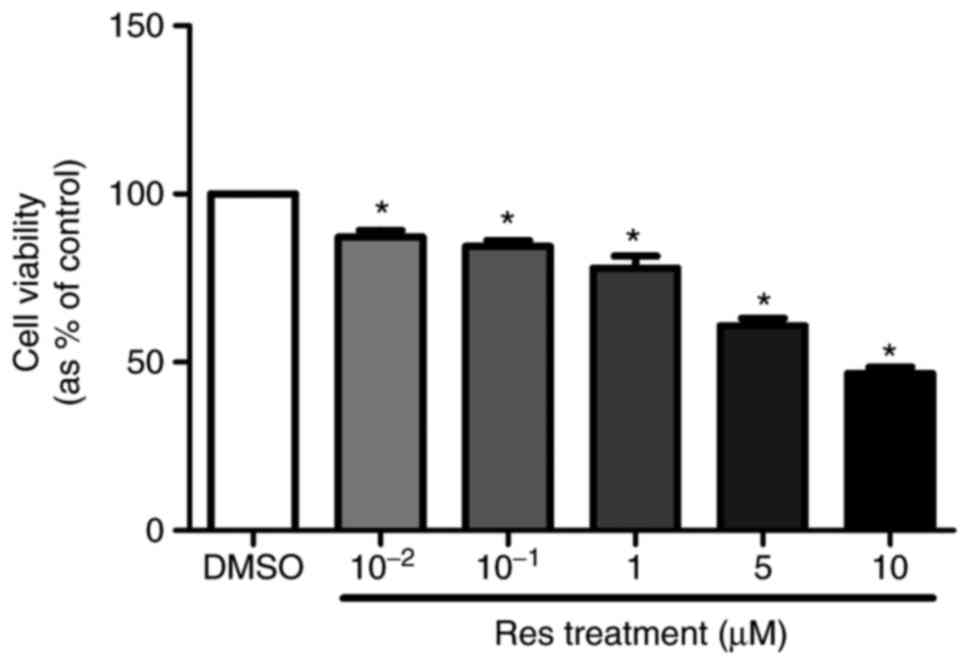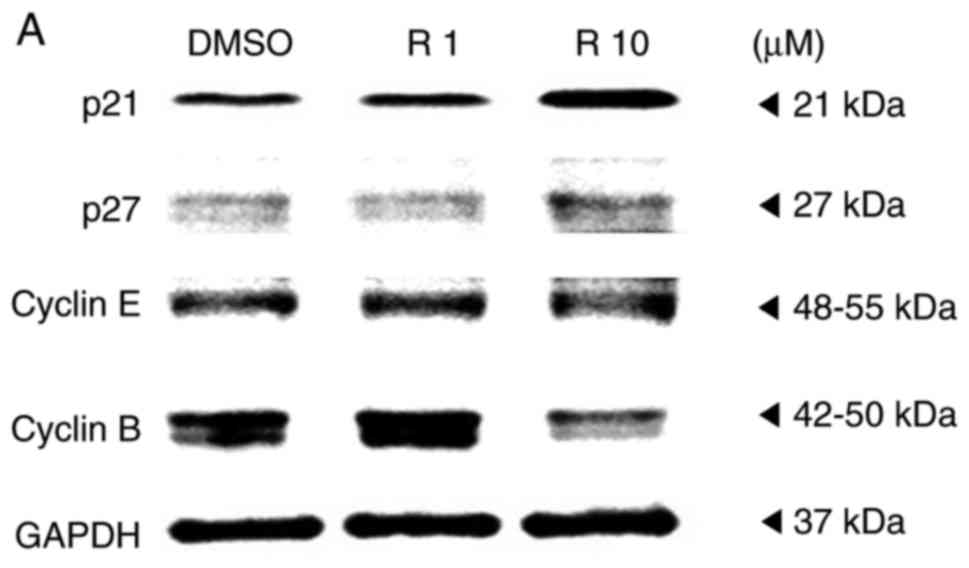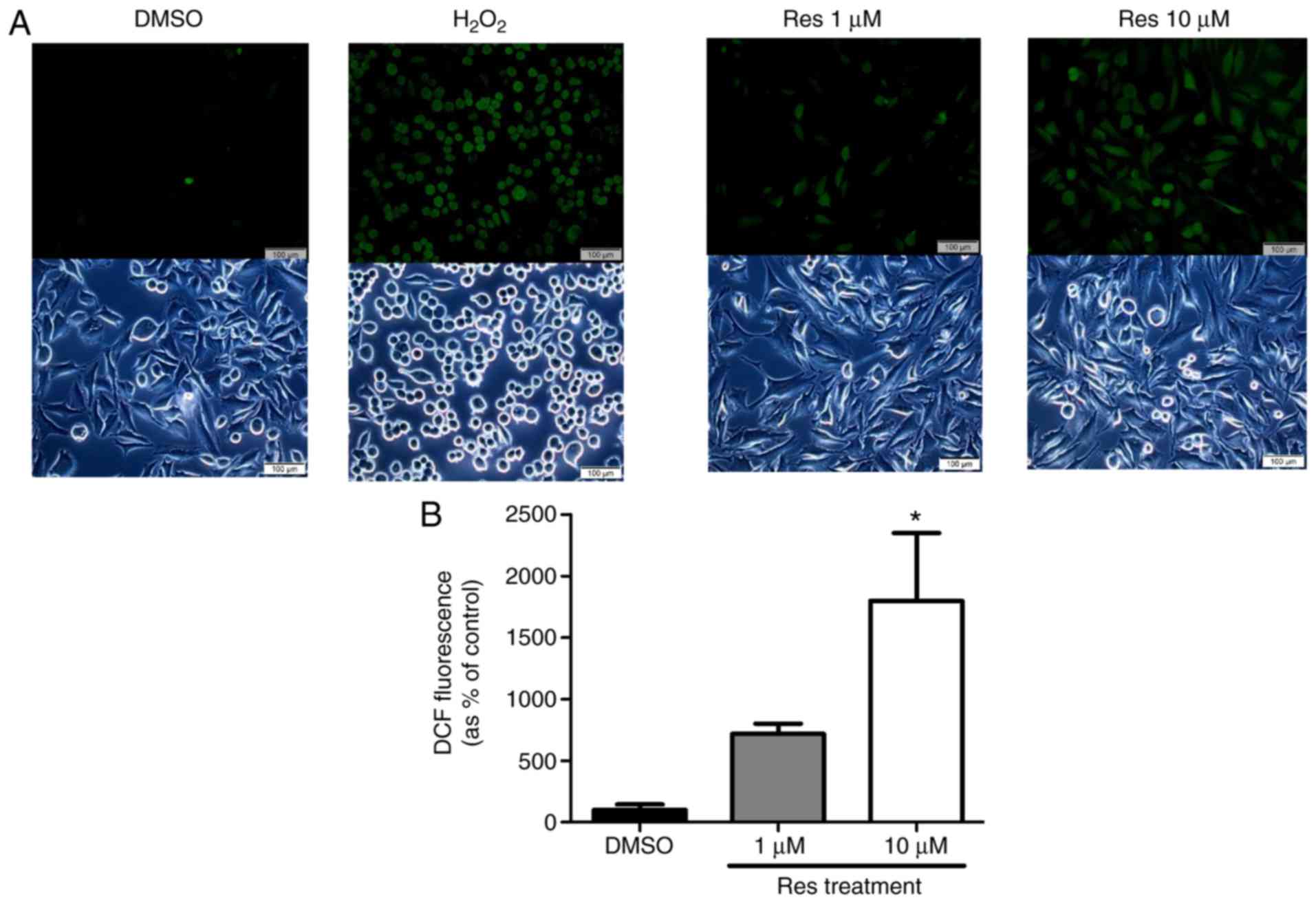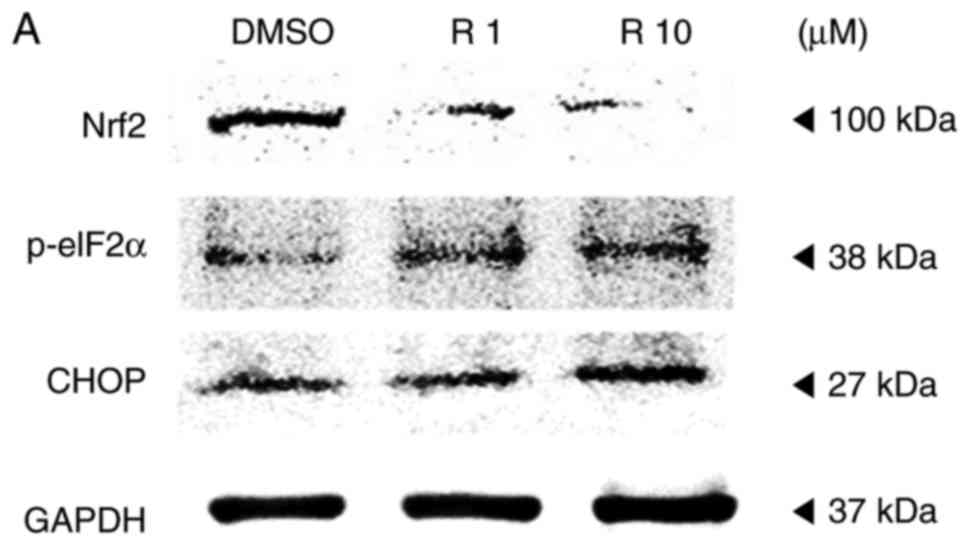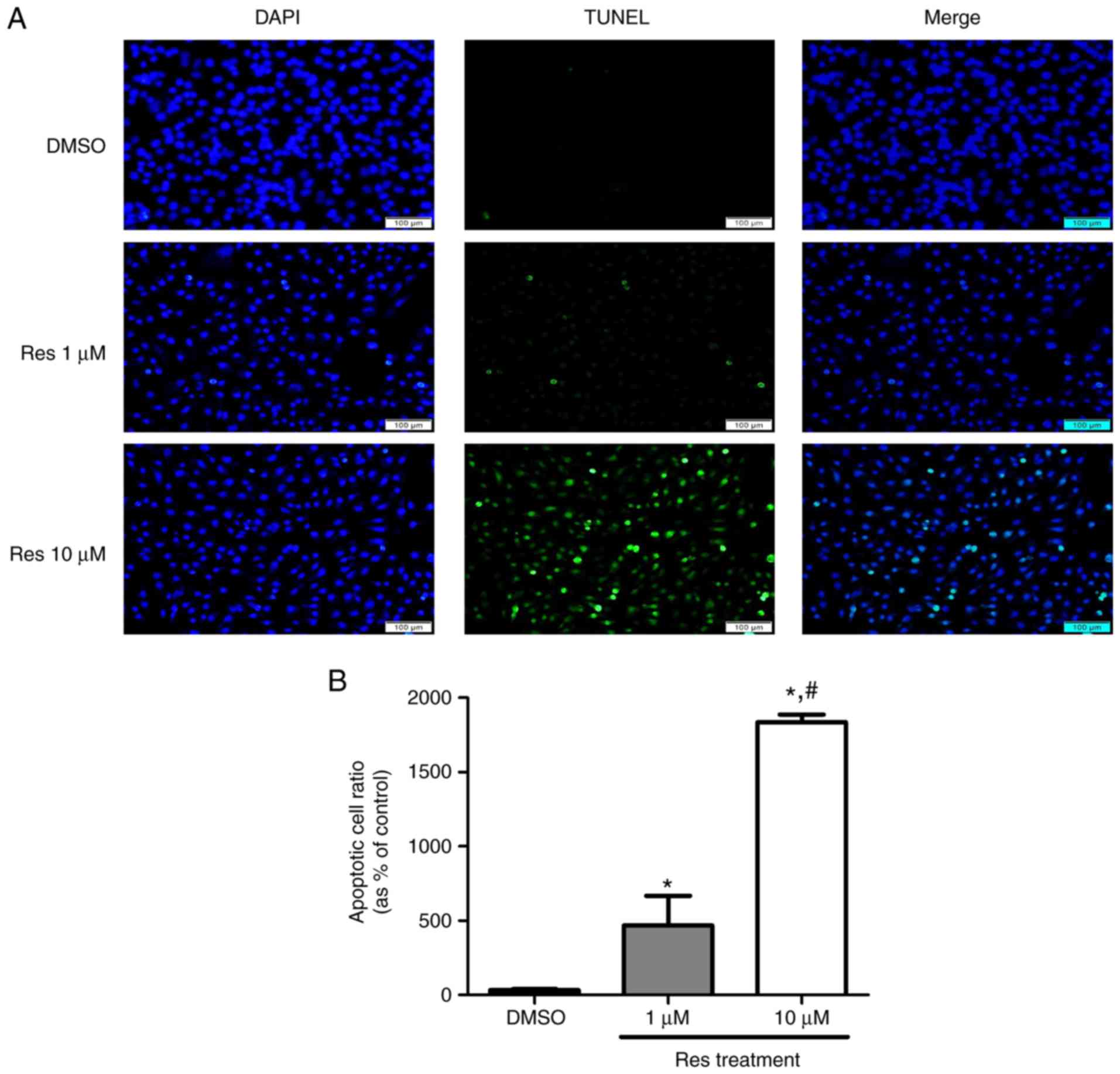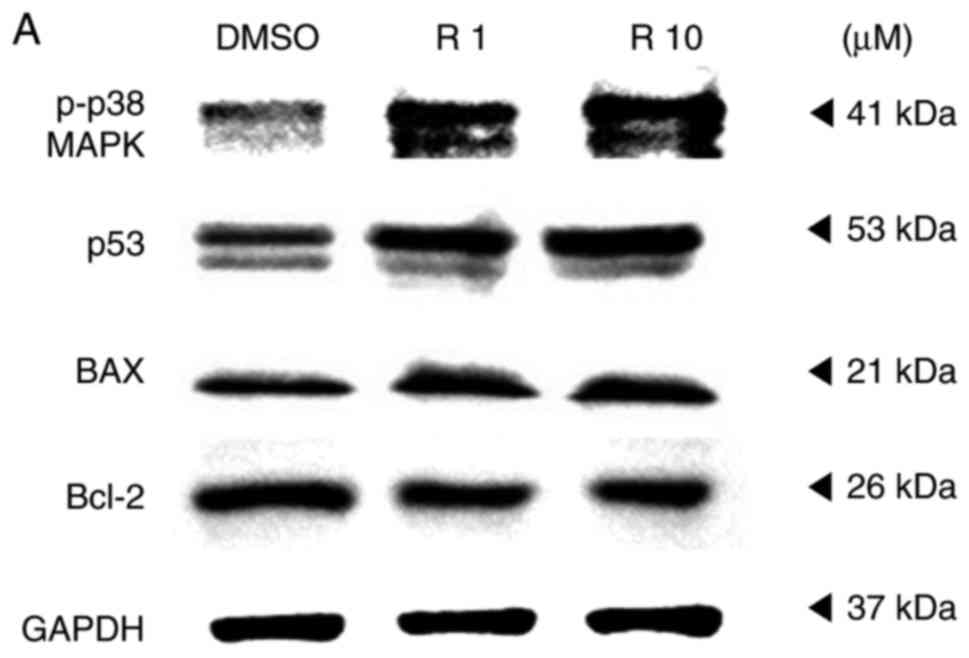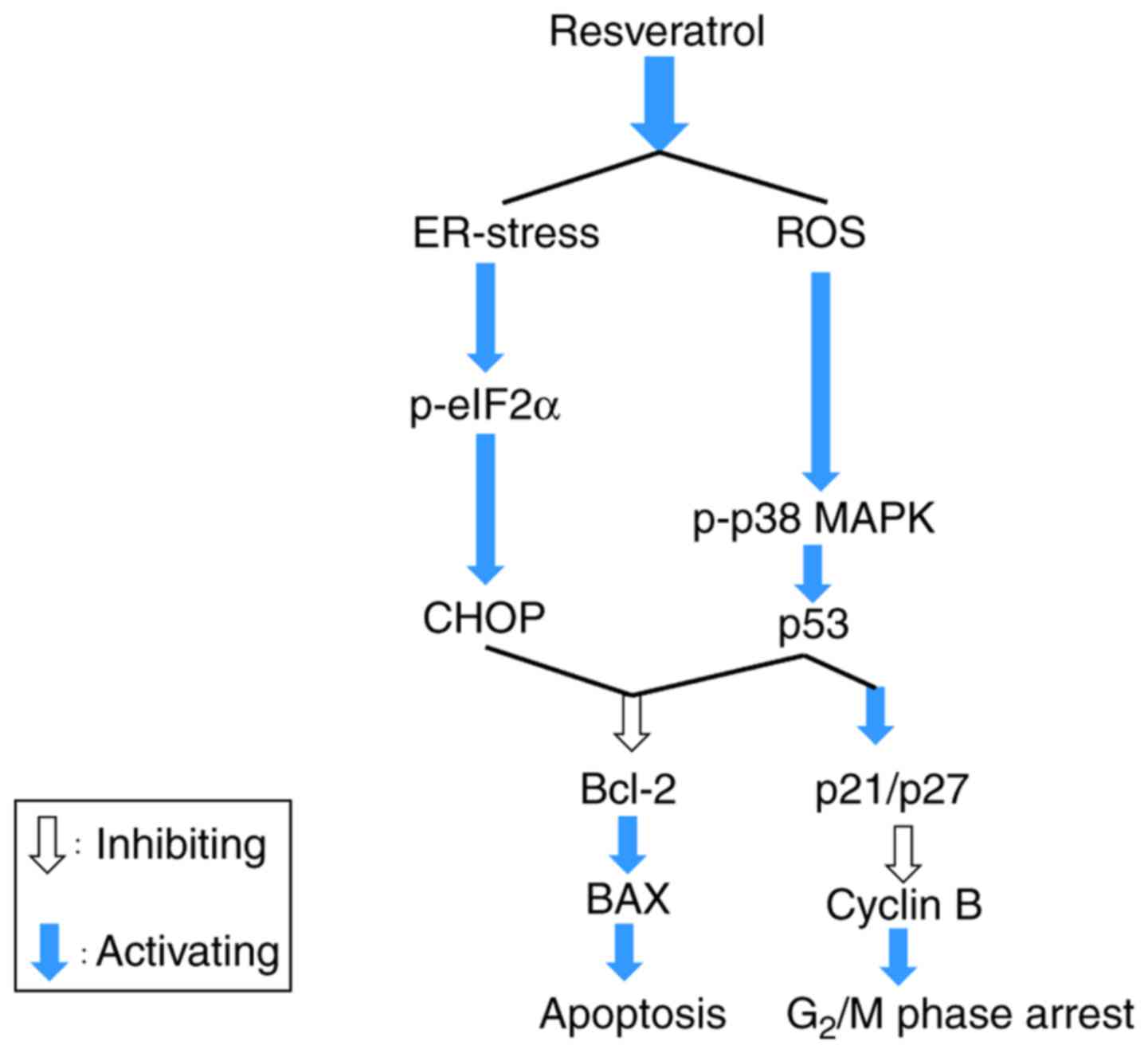|
1
|
Bandarchi B, Ma L, Navab R, Seth A and
Rasty G: From melanocyte to metastatic malignant melanoma. Dermatol
Res Pract. 2010:2010. View Article : Google Scholar : PubMed/NCBI
|
|
2
|
Vogelstein B and Kinzler KW: The genetic
evolution of melanoma. N Engl J Med. 374:9962016.PubMed/NCBI
|
|
3
|
Wellbrock C and Arozarena I: The
complexity of the ERK/MAP-kinase pathway and the treatment of
melanoma skin cancer. Front Cell Dev Biol. 4:332016. View Article : Google Scholar : PubMed/NCBI
|
|
4
|
Heo JR, Kim NH, Cho J and Choi KC: Current
treatments for advanced melanoma and introduction of a promising
novel gene therapy for melanoma (Review). Oncol Rep. 36:1779–1786.
2016. View Article : Google Scholar : PubMed/NCBI
|
|
5
|
Kraft TE, Parisotto D, Schempp C and
Efferth T: Fighting cancer with red wine? Molecular mechanisms of
resveratrol. Crit Rev Food Sci Nutr. 49:782–799. 2009. View Article : Google Scholar
|
|
6
|
Lee GA, Hwang KA and Choi KC: Roles of
dietary phytoestrogens on the regulation of epithelial-mesenchymal
transition in diverse cancer metastasis. Toxins (Basel). 8. pp.
E1622016, View Article : Google Scholar
|
|
7
|
Marcsek ZL, Kocsis Z, Szende B and Tompa
A: Effect of formaldehyde and resveratrol on the viability of Vero,
HepG2 and MCF-7 cells. Cell Biol Int. 31:1214–1219. 2007.
View Article : Google Scholar : PubMed/NCBI
|
|
8
|
Reagan-Shaw S, Mukhtar H and Ahmad N:
Resveratrol imparts photoprotection of normal cells and enhances
the efficacy of radiation therapy in cancer cells. Photochem
Photobiol. 84:415–421. 2008. View Article : Google Scholar : PubMed/NCBI
|
|
9
|
Baarine M, Thandapilly SJ, Louis XL, Mazué
F, Yu L, Delmas D, Netticadan T, Lizard G and Latruffe N:
Pro-apoptotic versus anti-apoptotic properties of dietary
resveratrol on tumoral and normal cardiac cells. Genes Nutr.
6:161–169. 2011. View Article : Google Scholar : PubMed/NCBI
|
|
10
|
Athar M, Back JH, Kopelovich L, Bickers DR
and Kim AL: Multiple molecular targets of resveratrol:
Anti-carcinogenic mechanisms. Arch Biochem Biophys. 486:95–102.
2009. View Article : Google Scholar : PubMed/NCBI
|
|
11
|
Jang M, Cai L, Udeani GO, Slowing KV,
Thomas CF, Beecher CW, Fong HH, Farnsworth NR, Kinghorn AD, Mehta
RG, et al: Cancer chemopreventive activity of resveratrol, a
natural product derived from grapes. Science. 275:218–220. 1997.
View Article : Google Scholar : PubMed/NCBI
|
|
12
|
Rojas C, Pan-Castillo B, Valls C, Pujadas
G, Garcia-Vallve S, Arola L and Mulero M: Resveratrol enhances
palmitate-induced ER stress and apoptosis in cancer cells. PLoS
One. 9:e1139292014. View Article : Google Scholar : PubMed/NCBI
|
|
13
|
Marciniak SJ, Yun CY, Oyadomari S, Novoa
I, Zhang Y, Jungreis R, Nagata K, Harding HP and Ron D: CHOP
induces death by promoting protein synthesis and oxidation in the
stressed endoplasmic reticulum. Genes Dev. 18:3066–3077. 2004.
View Article : Google Scholar : PubMed/NCBI
|
|
14
|
Rozpedek W, Pytel D, Mucha B, Leszczynska
H, Diehl JA and Majsterek I: The role of the PERK/eIF2α/ATF4/CHOP
signaling pathway in tumor progression during endoplasmic reticulum
stress. Curr Mol Med. 16:533–544. 2016. View Article : Google Scholar
|
|
15
|
Yen YP, Tsai KS, Chen YW, Huang CF, Yang
RS and Liu SH: Arsenic induces apoptosis in myoblasts through a
reactive oxygen species-induced endoplasmic reticulum stress and
mitochondrial dysfunction pathway. Arch Toxicol. 86:923–933. 2012.
View Article : Google Scholar : PubMed/NCBI
|
|
16
|
Birben E, Sahiner UM, Sackesen C, Erzurum
S and Kalayci O: Oxidative stress and antioxidant defense. World
Allergy Organ J. 5:9–19. 2012. View Article : Google Scholar : PubMed/NCBI
|
|
17
|
Poljsak B, Šuput D and Milisav I:
Achieving the balance between ROS and antioxidants: When to use the
synthetic antioxidants. Oxid Med Cell Longev. 2013:9567922013.
View Article : Google Scholar : PubMed/NCBI
|
|
18
|
Sies H: Oxidative stress: From basic
research to clinical application. Am J Med. 91:31S–38S. 1991.
View Article : Google Scholar : PubMed/NCBI
|
|
19
|
Zhou Y, Wang K, Zhen S, Wang R and Luo W:
Carfilzomib induces G2/M cell cycle arrest in human endometrial
cancer cells via upregulation of p21(Waf1/Cip1) and p27Kip1. Taiwan
J Obstet Gynecol. 55:847–851. 2016. View Article : Google Scholar
|
|
20
|
Tyner AL: A new year, a new role for p21.
Cell Cycle. 8:1832009. View Article : Google Scholar : PubMed/NCBI
|
|
21
|
Vaseva AV and Moll UM: The mitochondrial
p53 pathway. Biochim Biophys Acta. 1787:414–420. 2009. View Article : Google Scholar
|
|
22
|
Maverakis E, Cornelius LA, Bowen GM, Phan
T, Patel FB, Fitzmaurice S, He Y, Burrall B, Duong C, Kloxin AM, et
al: Metastatic melanoma-a review of current and future treatment
options. Acta Derm Venereol. 95:516–524. 2015. View Article : Google Scholar
|
|
23
|
Shukla Y and Singh R: Resveratrol and
cellular mechanisms of cancer prevention. Ann NY Acad Sci.
1215:1–8. 2011. View Article : Google Scholar : PubMed/NCBI
|
|
24
|
Georgieva J, Sinha P and Schadendorf D:
Expression of cyclins and cyclin dependent kinases in human benign
and malignant melanocytic lesions. J Clin Pathol. 54:229–235. 2001.
View Article : Google Scholar : PubMed/NCBI
|
|
25
|
Heiss EH, Schilder YD and Dirsch VM:
Chronic treatment with resveratrol induces redox stress- and ataxia
telangiectasia-mutated (ATM)-dependent senescence in p53-positive
cancer cells. J Biol Chem. 282:26759–26766. 2007. View Article : Google Scholar : PubMed/NCBI
|
|
26
|
de la Lastra CA and Villegas I:
Resveratrol as an antioxidant and pro-oxidant agent: Mechanisms and
clinical implications. Biochem Soc Trans. 35:1156–1160. 2007.
View Article : Google Scholar : PubMed/NCBI
|
|
27
|
Singh A, Sati S and Mishra R: Resveratrol:
Antioxidant-pro-oxidant. In J Tech Res Sci. 1:106–112. 2016.
|
|
28
|
Wang XJ, Sun Z, Villeneuve NF, Zhang S,
Zhao F, Li Y, Chen W, Yi X, Zheng W, Wondrak GT, et al: Nrf2
enhances resistance of cancer cells to chemotherapeutic drugs, the
dark side of Nrf2. Carcinogenesis. 29:1235–1243. 2008. View Article : Google Scholar : PubMed/NCBI
|
|
29
|
Menegon S, Columbano A and Giordano S: The
dual roles of NRF2 in cancer. Trends Mol Med. 22:578–593. 2016.
View Article : Google Scholar : PubMed/NCBI
|
|
30
|
Hayes JD, McMahon M, Chowdhry S and
Dinkova-Kostova AT: Cancer chemoprevention mechanisms mediated
through the Keap1-Nrf2 pathway. Antioxid Redox Signal.
13:1713–1748. 2010. View Article : Google Scholar : PubMed/NCBI
|
|
31
|
Rachakonda G, Sekhar KR, Jowhar D, Samson
PC, Wikswo JP, Beauchamp RD, Datta PK and Freeman ML: Increased
cell migration and plasticity in Nrf2-deficient cancer cell lines.
Oncogene. 29:3703–3714. 2010. View Article : Google Scholar : PubMed/NCBI
|
|
32
|
Ma Q: Role of nrf2 in oxidative stress and
toxicity. Annu Rev Pharmacol Toxicol. 53:401–426. 2013. View Article : Google Scholar : PubMed/NCBI
|
|
33
|
Moon EJ and Giaccia A: Dual roles of NRF2
in tumor prevention and progression: Possible implications in
cancer treatment. Free Radic Biol Med. 79:292–299. 2015. View Article : Google Scholar
|
|
34
|
Lau A, Villeneuve NF, Sun Z, Wong PK and
Zhang DD: Dual roles of Nrf2 in cancer. Pharmacol Res. 58:262–270.
2008. View Article : Google Scholar : PubMed/NCBI
|
|
35
|
Sood R, Porter AC, Ma K, Quilliam LA and
Wek RC: Pancreatic eukaryotic initiation factor-2alpha kinase (PEK)
homologues in humans, Drosophila melanogaster and Caenorhabditis
elegans that mediate translational control in response to
endoplasmic reticulum stress. Biochem J. 346:281–293. 2000.
View Article : Google Scholar : PubMed/NCBI
|
|
36
|
Xu C, Bailly-Maitre B and Reed JC:
Endoplasmic reticulum stress: Cell life and death decisions. J Clin
Invest. 115:2656–2664. 2005. View
Article : Google Scholar : PubMed/NCBI
|
|
37
|
Shi Y, Vattem KM, Sood R, An J, Liang J,
Stramm L and Wek RC: Identification and characterization of
pancreatic eukaryotic initiation factor 2 alpha-subunit kinase,
PEK, involved in translational control. Mol Cell Biol.
18:7499–7509. 1998. View Article : Google Scholar : PubMed/NCBI
|
|
38
|
Liu B, Cheng Y, Zhang B, Bian HJ and Bao
JK: Polygonatum cyrtonem lectin induces apoptosis and autophagy in
human melanoma A375 cells through a mitochondria-mediated
ROS-p38-p53 pathway. Cancer Lett. 275:54–60. 2009. View Article : Google Scholar
|















